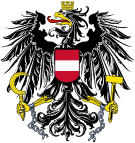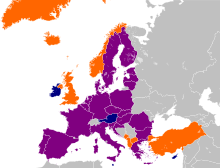Austria–NATO relations
 | |
NATO |
Austria |
|---|---|
| This article is part of a series on the |
| Politics of Austria |
|---|
 |
History

| NATO member countries Accession protocol signed Countries in the process of accession Countries promised invitations | Membership is not the goal Countries have not announced their membership intentions |


Austria was occupied by the four victorious Allied powers following World War II under the Allied Control Council, similar to Germany. During negotiations to end the occupation, which were ongoing at the same time as Germany's, the Soviet Union insisted on the reunified country adopting the model of Swiss neutrality. The US feared that this would encourage West Germany to accept similar Soviet proposals for neutrality as a condition for German reunification.[1] Shortly after West Germany's accession to NATO, the parties agreed to the Austrian State Treaty in May 1955, which was largely based on the Moscow Memorandum signed the previous month between Austria and the Soviet Union. While the treaty itself did not commit Austria to neutrality, this was subsequently enshrined into Austria's constitution that October with the Declaration of Neutrality. The Declaration prohibits Austria from joining a military alliance, from hosting foreign military bases within its borders, and from participating in a war.[2]
Membership of Austria in the
Following the decision of Finland and Sweden to abandon decades of non-alignment and apply to join NATO in 2022, there has been renewed debates on Austria joining the bloc, similar to how Austria joined the EU alongside Finland and Sweden.[5][6][7] On May 8, 2022, a coalition of politicians, diplomats, artists and business-people wrote an open letter to the Austrian government asking them to review their commitment to neutrality, however, the only party to openly support the effort was NEOS with just 15 of the 183 seats in the National Council.[8][9] Austrian Chancellor Karl Nehammer stated that the country would continue its policy of neutrality.[10]
Opinion polls on Austrian membership of NATO
| Dates conducted |
Pollster | Sample size |
Support | Oppose | Neutral or DK |
Lead | Ref. | |
|---|---|---|---|---|---|---|---|---|
| 7 March 2024 | Sweden acceedes to NATO | |||||||
| 11–13 April 2023 | Austrian Society for European Politics | 1000 | 21% |
60% |
19% | 39% | [11] | |
| 4 April 2023 | Finland acceedes to NATO | |||||||
| 6–12 May 2022 | APA | 1000 | 14% | 75% | 11% | 59% | [12] | |
| 3-4 March 2022 | Austrian Society for European Politics | 500 | 17% |
64% |
19% | 47% | [11] | |
| 24 February 2022 | Russia invades Ukraine | |||||||
| 15-21 March 2021 | Austrian Society for European Politics | 1000 | 23% |
62% |
15% | 39% | [11] | |
| 16 March 2014 | Russia annexes Crimea | |||||||
| 7 August 2008 | Russia invades Georgia | |||||||
| July 1996 | IMAS research institute | ? | 16% | 63% | 21% | 47% | [13] | |
| July 1995 | IMAS research institute | ? | 18% | 70% | 12% | 58% | [14] | |
Relationship timeline
| Event | Date |
|---|---|
| Partnership for Peace | 1995-02-10 |
Austria's foreign relations with NATO member states
 Albania
Albania- Belgium
 Bulgaria
Bulgaria Canada
Canada Croatia
Croatia Czech Republic
Czech Republic Denmark
Denmark- Estonia
 Finland
Finland France
France Germany
Germany Greece
Greece Hungary
Hungary- Iceland
 Italy
Italy- Latvia
- Lithuania
 Luxembourg
Luxembourg Montenegro
Montenegro Netherlands
Netherlands North Macedonia
North Macedonia Norway
Norway Poland
Poland- Portugal
 Romania
Romania- Slovakia
 Slovenia
Slovenia Spain
Spain- Sweden
 Turkey
Turkey United Kingdom
United Kingdom United States
United States
See also
- Foreign relations of Austria
- Foreign relations of NATO
- Enlargement of NATO
- Partnership for Peace
- NATO open door policy
- Declaration of Neutrality
- Neutral member states in the European Union
- Accession of Austria to the European Union
- European Union–NATO relations
NATO relations of other EU member states outside NATO
References
- ^ "Austrian State Treaty, 1955". United States Department of State. 18 July 2008. Archived from the original on 12 January 2023. Retrieved 6 June 2022.
- ^ a b "EXPLAINED: The history behind Austria's neutrality". TheLocal. 8 February 2022. Archived from the original on 13 May 2022. Retrieved 12 May 2022.
- ^ Hoare, Liam (22 March 2022). "As Finland and Sweden consider Nato membership, Austria clings to neutrality". The New Statesman. Archived from the original on 12 May 2022. Retrieved 13 May 2022.
- ^ Scally, Derek (11 May 2022). "Austria holds to neutrality tradition despite Nordic shift to Nato". The Irish Times. Archived from the original on 13 May 2022. Retrieved 20 May 2022.
- ^ Walter, Jan D. "Will Austria abandon neutrality to join NATO?". Deutsche Welle. Retrieved 15 March 2024.
- ^ Barber, Tony. "Rethinking neutrality in Europe". Financial Times. Retrieved 15 March 2024.
- ^ Gady, Franz-Stefan. "Why Neutrality Is Obsolete in the 21st Century". Foreign Policy. Retrieved 15 March 2024.
- ^ "Austria — it's time to join NATO". politico. Retrieved 15 March 2024.
- ^ "Zweiter offener Brief an den Bundespräsidenten, die Bundesregierung, den Nationalrat und die Bevölkerung Österreichs". .unseresicherheit.org. Retrieved 15 March 2024.
- ^ "Austria's neutrality in the spotlight after Sweden-Finland NATO bid". EurActiv. 18 May 2022.
- ^ a b c "ÖGfE survey: EU membership, Security and Partners on the Global Stage". Österreichische Gesellschaft für Europapolitik. 2 May 2023. Retrieved 24 July 2023.
- ^ "Majority of Austrians reject joining NATO". thelocal.at. 6 May 2022.
- ^ "Austrians begin to question neutrality". 24 July 1996.
- ^ "Austrians begin to question neutrality". 24 July 1996.




